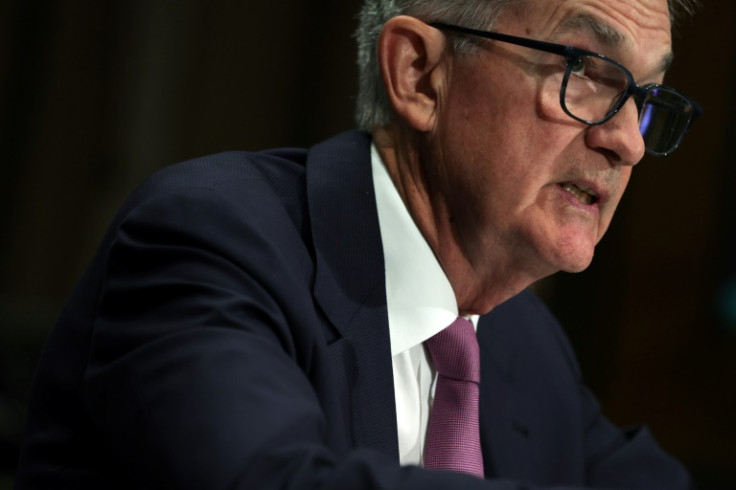Powell: Fed 'Still Has A Long Way To Go' To Tame Inflation
Federal Reserve Chair Jerome Powell said two months of good inflation data are "only the beginning."

Federal Reserve Chair Jerome Powell said inflation remains too high in the U.S. and the central bank is prepared to raise rates further if appropriate.
In a Friday speech at the Federal Reserve Bank of Kansas City's annual Economic Policy Symposium near Moran, Wyoming, Powell shared a brief outlook of the national economy and his assessment of the Fed's mission to bring year-over-year inflation down to 2%.
"We ... intend to hold policy at a restrictive level until we are confident that inflation is moving sustainably down toward our objective," Powell said.
The unwinding of coronavirus pandemic-related supply challenges and the effects of the Fed's monetary policy changes are starting to show results in driving down inflation. However, "the process still has a long way to go, even with the more favorable recent readings," he said.
"The lower monthly readings for core inflation in June and July were welcome, but two months of good data are only the beginning of what it will take to build confidence that inflation is moving down sustainably toward our goal," Powell said. "We can't yet know the extent to which these lower readings will continue or where underlying inflation will settle over coming quarters."
The Fed and the Federal Open Markets Committee have steadily hiked rates since March 2022 in response to the rise in core inflation, which peaked at 9.1% — as reported by the Bureau of Labor Statistics' Consumer Price Index figures — in June 2022. Two recent CPI figures, from June and July, indicated inflation is trending downward.
The most recent rate hike, in July, set the target range of the federal funds rate by .25% to a range of 5.25% to 5.5%, the highest such rate in 22 years. The FOMC is set to meet again on Sept. 19-20.
Powell reviewed how the Fed's policy, and other economic factors, are affecting the housing market, demand for durable goods, overall services and the the job market.
Motor vehicle price inflation spiked in the pandemic years as demand for vehicles rose, interest rates were low and supply shrunk additionally due to a shortage of semiconductors. When the effects of the pandemic waned, supplies improved and interest rates rose then inflation dropped.
Powell explained a similar process for overall core goods inflation. He said he expected the effects of the Fed's monetary policy will continue to materialize over time.
"Core goods inflation remains well above its pre-pandemic level," Powell said. "Sustained progress is needed, and restrictive monetary policy is called for to achieve that progress."
In housing, he said the effects of monetary policy were more evident quicker. Mortgage rates doubled in 2022 which caused housing starts and sales to fall and housing price growth to fall. Rents increased then fell.
"If market rent growth settles near pre-pandemic levels, housing services inflation should decline toward its pre-pandemic level as well," Powell said. "We will continue to watch the market rent data closely for a signal of the upside and downside risks to housing services inflation."
Year-over-year inflation in non-housing services, like healthcare, food services, transportation and accommodations, has moved "sideways" since rate hikes began, Powell said. Inflation over the past three months and six months is declining, however, which he called "encouraging."
The Fed cannot achieve the so-called soft landing, bringing year-over-year inflation to a more normal 2% without a recession, alone. Powell said the central bank will need help from the overall U.S. economy and the labor market. The Fed needs some "below-trend economic growth" and softening of labor market conditions.
Restrictive policy is supporting the expectation of below-trend growth, he said, but there are also signs the economy is not cooling as expected.
"Additional evidence of persistently above-trend growth could put further progress on inflation at risk and could warrant further tightening of monetary policy," Powell said.
Moreover, the labor market is "rebalancing" and the Fed expects it to continue. Nevertheless, if evidence emerges that the labor market is no longer easing it could "call for a monetary policy response."
Powell acknowledged the Fed's moves aren't going to have immediate effect on the economy and the U.S. is likely still awaiting the full effect of its tightening strategy. This makes it harder to judge its results.
"Doing too little could allow above-target inflation to become entrenched and ultimately require monetary policy to wring more persistent inflation from the economy at a high cost to employment," Powell said. "Doing too much could also do unnecessary harm to the economy."
Going forward, he said the Fed and the FOMC will continue to assess all the data and "will proceed carefully" as it considers whether to raise rates again or to "hold the policy rate constant and await further data."
"Restoring price stability is essential to achieving both sides of our dual mandate. We will need price stability to achieve a sustained period of strong labor market conditions that benefit all," Powell said. "We will keep at it until the job is done."
On Thursday evening, the Kansas City Fed released the full agenda for the so-called Jackson Hole symposium. Papers and handouts from speakers will be released periodically on the website.
According to the agenda, European Central Bank President Christine Lagarde is scheduled to speak on Friday at 2 p.m. Eastern Daylight Time about Europe and the Global Economy.
On Saturday, World Trade Organization Director General Ngozi Okonjo-Iweala, Bank of Japan Governor Kazuo Ueda and Bank of England Deputy Governor Ben Broadbent are set to appear on a panel, scheduled for 11:25 a.m. Eastern Daylight Time, on globalization.
© Copyright IBTimes 2024. All rights reserved.






















